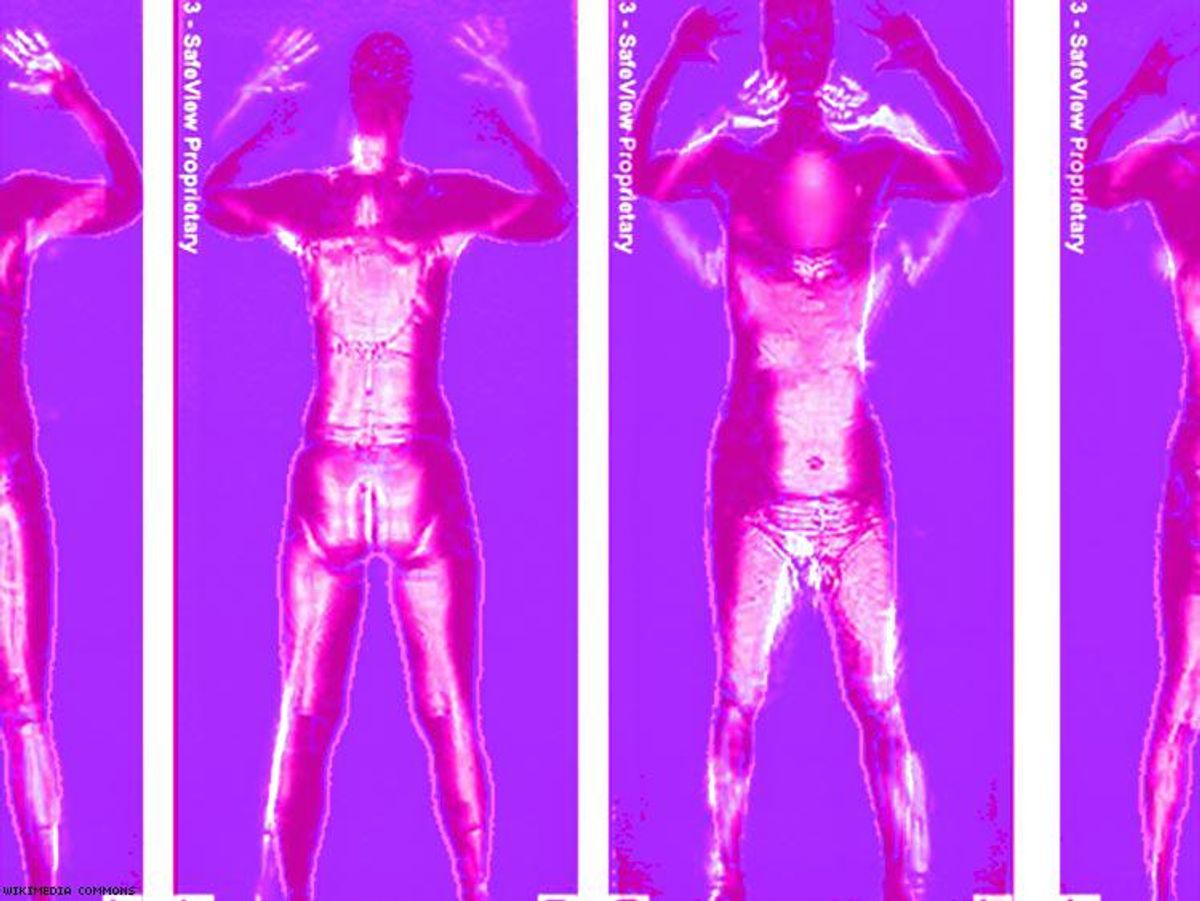On the eve of the Christmas getaway, the Transportation Security Administration tells The Advocate it has chosen a new word for its airport screening agents to use whenever their imaging machines encounter a transgender traveler whose anatomy does't match the standard binary.
The TSA reveals the new word is "alarm," and it now appears on the TSA's website. A spokesperson says it is already in use by agents at all U.S. airports.
"TSA has implemented this change in terminology and we have communicated it through various methods to the frontline workforce."
Until recently the TSA used the term "anomaly," which would require agents more closely examine the passenger as a potential security risk. That's what happened to TV comedy producer and trans woman Shadi Petosky of Los Angeles in September when she was live-tweeted her experience.
Petosky's plight made national headlines, and the crying selfie she snapped was seen and shared all around the world. Activists subsequently created a hashtag for trans folks to document their experiences #TravelingWhileTrans.
The TSA's website explains that when agents encounter an "alarm" or, in other words, a discrepancy that requires additional screening, they'll follow the same procedures as before:
"If there is an alarm, TSA officers are trained to clear the alarm, not the individual. Additional screening is conducted to determine whether a prohibited item is present."
In Petosky's case, that "item" was her penis.
The month after Petosky's incident, TSA national spokesman Mike England and Kimberly Walton, assistant administrator of TSA's Office for Civil Rights and Liberty, revealed the agency had decided to replace the word "anomaly."
But the TSA didn't yet have new terminology in place, and officials told The Advocate they were working with trans advocates and the broader community to find a solution. When The Advocate contacted those groups named by the TSA, some indicated they had never been contacted by the TSA in this effort.
The spokesperson today confirmed, "TSA guidance from TSA Headquarters provides that TSA officers may no longer use the term 'anomaly.' As with any institutional change, while the new term has been launched, it will take time for the change to fully socialize."
"We thank the public for their patience as the message filters through to all personnel nationwide," the spokesperson continued, "and as personnel become accustomed to different terminology."
Although the wording has changed, the TSA's updated website has not changed the process for screening transgender travelers whose bodies don't match what the imaging machines are programmed to accept as "male" and "female."
"You may also undergo a pat-down procedure if you alarm the screening equipment and/or at random," says the site.
However, a recent update to TSA screening protocols eliminated the option for some travelers to "opt-out" of the body scanners in favor of a pat-down, mandating all passengers, except those with disabilities, medical conditions, or other special needs, enter the full-body scanner. The TSA maintains that this shift in policy is a minor one that takes into account additional security concerns, and that "the vast majority of passengers will not be affected."
All travelers who are screened through the imaging machines are still eyeballed by a TSA agent who judges whether they appear to be male or female; they press a button, and on a screen, a blue icon lights up for men, pink for women. When asked what the TSA's recommendation is for intersex and gender-nonconforming individuals, the spokesman said, "We decline to comment on the specifics of any individual passenger's screening experience."
In October, Walton explained the process this way:
"The technology that we deploy, the best technology for the current and historical threat, does require the transportation security officer to either identify the person as a male or female. And that technology, it does depend on human anatomy. And so in a situation where a transgender traveler is coming through the checkpoint, that decision is made based on the way the individual presents."
This is important because any individual who doesn't fit the binary, as programmed, sets off the "alarm" and will require additional screening.
The TSA is adamant that its intent is not to make traveling more difficult for anyone, but rather to prevent a terrorist from sneaking explosives aboard a plane by concealing them somewhere on their body.
In Petosky's opinion, the TSA's change in terminology is a superficial one that she perceives as a public relations move, describing the shift as "the very least [TSA] can do."
"Being alarmed by my body isn't any better," Petosky continues. "They are still disproportionally flagging trans, intersex, and gender-nonconforming bodies because we are excluded from their system. They still need to take me in a private room and touch my genitals."
When asked for an update on the investigation into how Petsosky was treated by TSA in Orlando in September, the spokesman said the agency would communicate its findings directly to her.
She has plans to fly on Christmas. Last weekend she tweeted a plea to the TSA:
She tells The Advocate that if she sets off an "alarm" in her future travels, she will ask to be re-scanned using a different gender setting on the scanner. She will not consent to a private screening where agents touch her genitals. Petosky is aware that by refusing to comply with that request, she may be removed from the airport.
"If they kick me out of the airport, I'll go back on and hope for a different officer," she explains. "It's all luck of the draw."



















































































